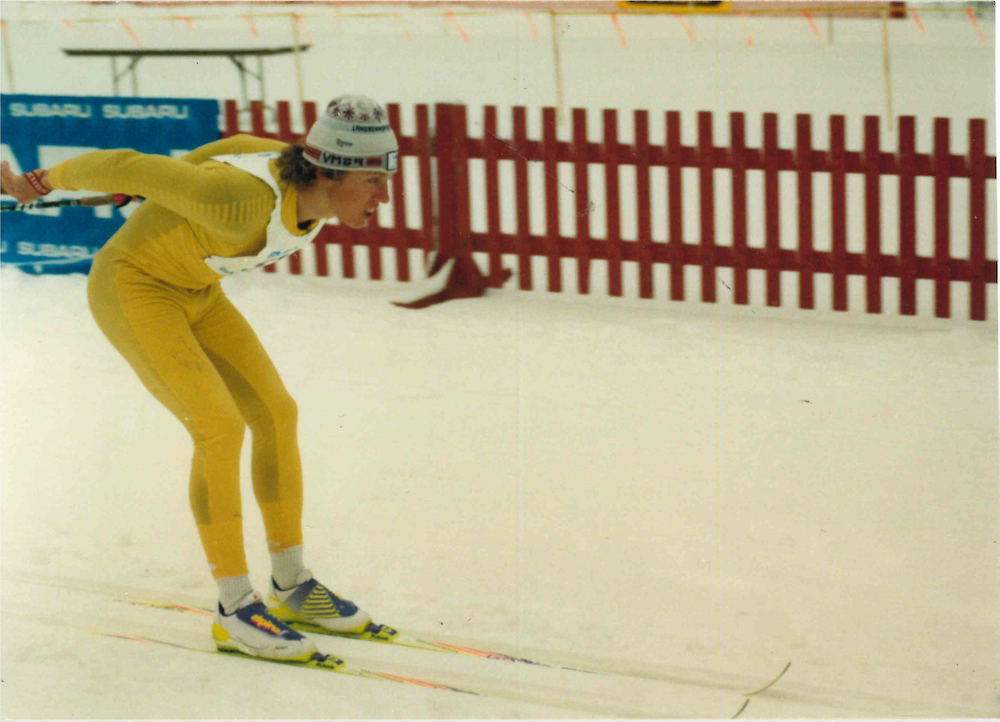
Editor’s note: This is the second essay in our new series, “Letters to my younger self.” Lauren Fleshman provided the modern locus classicus for this genre; Adam Verrier ably takes up the mantle here. While the first two essays, from Adam now and John Wood before him, have set a high bar, the general theme of this series is clear: If you were writing a letter to your younger self, what would you want to tell them about skiing, life, or skiing and life? Additional contributions from our readers are respectfully requested and gratefully accepted; see the bottom of this article for our contact info.
Adam grew up in New Hampshire, as he discusses in this memoir. He skied collegiately for the University of Wyoming, when it had an NCAA ski team, and was a nordic ski Olympian at the 1994 Lillehammer Games. He began dominating Anchorage endurance sports soon after, with wins in the Crow Pass Crossing, Lost Lake Run, and Tour of Anchorage among many other items on his local race résumé. He has the all-time record for podium finishes in the Tour of Anchorage 50k skate, the unofficial Alaska citizens championship contested by dozens of Olympians over the years, with eight. At 53, Verrier recently qualified for the classic sprint heats in a loaded Anchorage JNQ field, only to bow out so that a junior could race instead. He has announced numerous prominent American ski races. He founded the iconic Oosik Classic ski race now held in Talkeetna, Alaska. And he is a very, very nice guy.
But “None of these things define who Adam Verrier is,” current University of Alaska Anchorage head coach title Sparky Anderson wrote in a recent blog post. “Adam is a musician, a connoisseur of experience, deeply interested in anyone lucky enough to engage him in conversation, a rural Alaska home appraiser, and an avid clothing-optional motorcycle operator.” As Anderson also notes, Verrier has been a volunteer assistant coach for the UAA ski team since 2001. Verrier keeps a delightful, sometimes idiosyncratic blog about the UAA nordic team here.
By Adam Verrier
Dear Seventeen-Year-Old Adam,
I’ve been asked by FasterSkier.com to write a letter to my “younger self.” So this is your future 53-year-old self, with some advice and some insights based on the intervening 36 years’ worth of life experience between you and me. (By the way, FasterSkier.com is a “website” on the “internet.” Since it’s 1985, you’ve probably never heard these terms before, but that’s a topic for another conversation.)
Under normal circumstances, I’d never write to you from the future and spoil your suspense. After all, isn’t life all about finding your own way forward, being ignorant but curious, charting your own course, trying to make good decisions, and hoping for a little luck, too? To write to you from the future with the answers seems like a great way to deprive you of most of the excitement and joy that a life has to offer. So ordinarily, I would never agree to this. But since I don’t believe in time travel, I’ve agreed to participate.
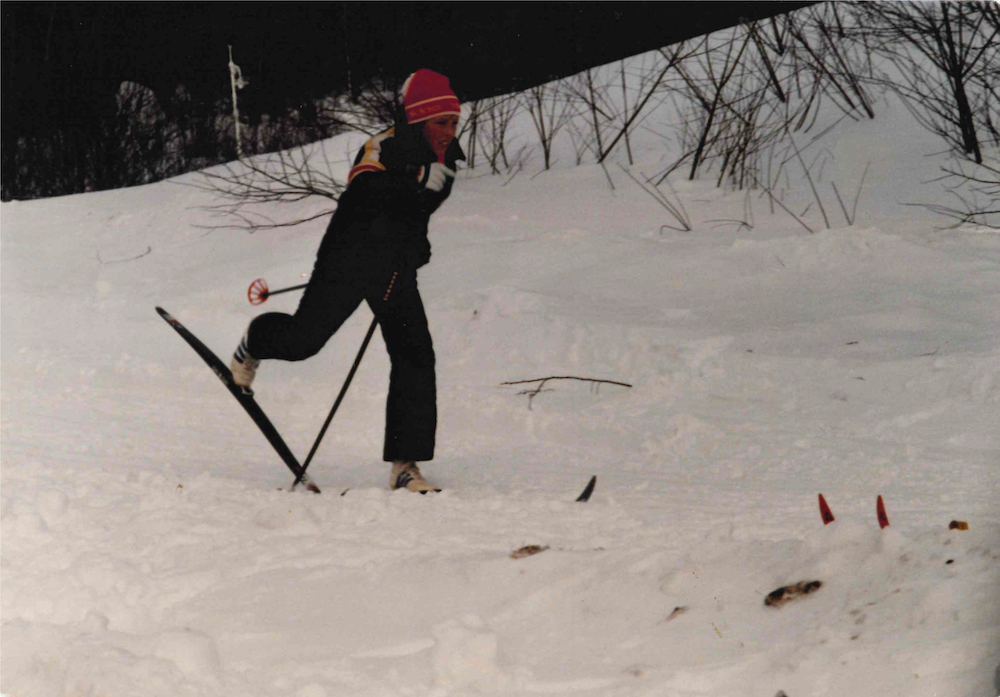
As fate would have it, I had a conversation just last week about pretty much this same topic during ski practice with the women on the college team that I’ve been volunteer-assistant coaching for years. It was suggested, during our warm down after a set of intervals, that I use my little mobile recorder to tape conversations with them – our college skiers – about skiing, about life, about their hopes and dreams – and then we could listen to it 20 or 30 years in the future and see how differently things will turn out in reality, as compared with how we now think they will.
When I was their age, I had such a dramatically different set of goals and ambitions for myself from what has actually transpired over the years from then until now. I never would have imagined my life would follow the path that it has, and I’d have never imagined that I’d end up living in Alaska. And I expect they’ll feel the same way thirty years from now. Because, really, isn’t it that way for most people who are curious and open to new ideas and new experiences?
At this point in your young life, Adam, I know that things are looking and feeling pretty dark. High school is a struggle, and you hate it. It seems you’re spending all your time studying and doing homework, and trying so hard just to get C-minuses. No matter how hard you try to understand it, algebra doesn’t make any sense at all, chemistry is beyond your comprehension, and your English teacher thinks your writing sucks.
Cross-country skiing is your favorite sport, but you’ve never really been very good at it. I mean, yes, good locally against your friends, but you’re not remotely in the same league as the best skiers in the New England. You’ve been racing in all the New England qualifying races, trying to make Junior Nationals for years, but have never qualified. And you’ve never even been very close to making it. You want to go to college but there’s the question of how to pay for it. Joining the military and using the G.I. Bill to go to college like Uncle Tommy seems like the most likely route, but there’s also the chance that distance running could get you a Division 1 college athletic scholarship. Because running is the thing that you’re actually very good at. Problem is, while you love cross-country skiing, you dislike running. You find it jarring and uncomfortable, and you can’t imagine having to keep doing all that running, all the way through college. You feel like you’d probably rather join the military.
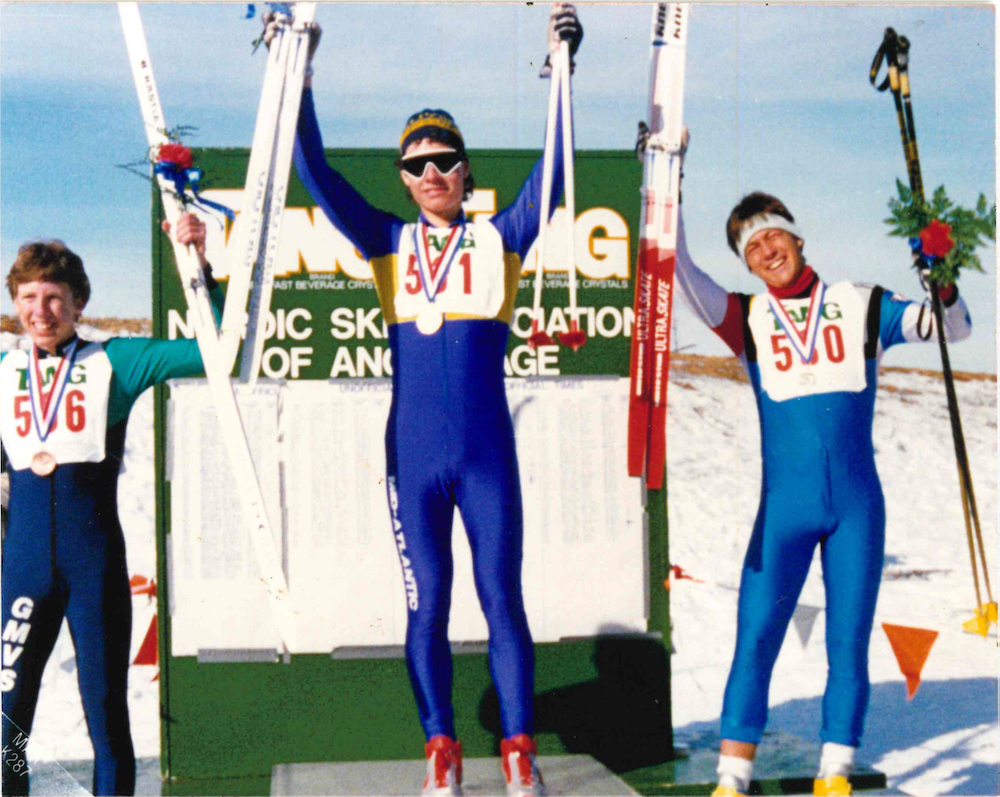
As I said earlier, I’m now a volunteer assistant ski coach for an NCAA ski team. Yeah, seems hard to imagine now, doesn’t it? I get to be the “team uncle” to this group of kids (older than you, I know, but I call them kids) who are talented and smart and ambitious. When I think back to when I was seventeen, it seems unimaginable that I’d go from being a frustrated high-school athlete with a strong work ethic but dim prospects, to being someone that they’d let hang out with a group of elite athletes like we have here on this college team. But somehow I went from there to here. And I’m going to tell you how I think it happened. I will tell you what your future has in store for you, and how I think you could do a lot better, with less frustration and misery than what I’ve put myself through.
In the very near future, you’re going to have some luck in one particular ski race – the New Hampshire state high school championship. Due to some inclement weather conditions (heavy snow and rain on race day) and because you’ll have extraordinarily fast skis on that day (due to pure luck with the weather – maybe all those rocks you’ve hit gave your bases lots of anti-suction structure to handle the soggy snow) you’ll win a race against skiers who are usually a lot faster than you. This one lucky result will open a door, which will lead to other opportunities, and your goals and ambitions will change with each new result and new opportunity.
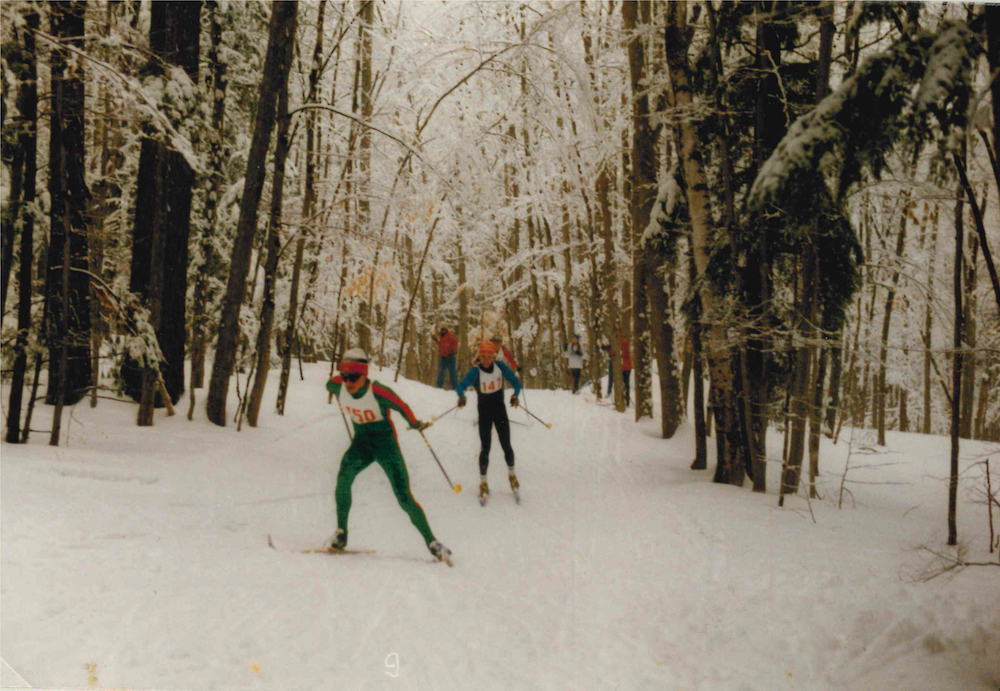
I know that becoming a member of a college ski team doesn’t seem realistic now. It seems like either distance running or the military are the options for getting tuition paid for. Because you’re definitely not going to do it with an academic scholarship, the way things are going! But because of this one lucky race, you’re going to take the opportunity that’ll be offered to spend your senior year of high school at a ski academy. There, you’ll find out that you really don’t have very good skiing technique, and that this lack of technique is likely the reason your running is so much better than your skiing. You’ll also find out that, even though you train more, and far harder, than all your high school teammates now, you’re really not training very much at all, compared to the best in your age group. Finding out about this thing called a “training log,” and having teammates who are surprised you don’t know how to “V2-skate”… a lot is going to change in the near future.
One thing that’s going to keep changing is your goals and ambitions. I know what your goal is now: to find a way – any way – to escape rural northern New Hampshire and go west – anywhere west of the great plains – like your uncle Ronnie who escaped New England and became a cook at a restaurant in Lake Tahoe. Uncle Ronnie’s accomplishment – his escape from rural life – has been your ambition for as long as you can remember.
But you’ll find that just one year at the ski academy (Green Mountain Valley School), coached by one of most energetic and extraordinary women you’ll ever know, will change your thinking dramatically. Having never qualified for the New England Junior Nationals squad, you’ll finally qualify next year as an eighteen-year-old, and then actually win gold and silver at Junior Nationals, and it will seem very surreal and weird, like it’s not even you doing the skiing that week. Because everybody, especially you yourself, knows that you’ve never been fast enough to beat any of these other kids; they’ve always been much faster than you. But you’ll have to reconcile yourself with this new reality.
This result will provide the opportunity to be on a Division 1 college ski team. It will provide the opportunity to go west. To the University of Wyoming! As a high school senior, your goal will be, by the time you’re a senior in college, to get a few top-20 finishes in some western college races. If you can accomplish this, you’ll feel like you can legitimately call yourself an elite skier and a big success.

(Courtesy photo)
I know this is going to sound utterly unbelievable to your 17-year-old self, but one thing is going to lead to another, and there are actually going to be some college wins in your future. There’s even going to be some World Cup racing and an Olympics. I know that this isn’t even remotely on your radar at this time in your life, but you’ll be shocked at how your future reality will differ from the way you imagine it now, when your only goal is to escape from this dark, rural life in this little town where it feels like nothing has ever happened, and it seems nothing ever will.
One thing that’s going to be of use to you as you move upward and onward in this sport is your inclination toward angst and melancholy. The discomfort that’s endemic to this sport will be an opportunity to explore your tendency to gravitate toward the dark and difficult, and toward isolation and self-reflection. Your most memorable, most rich, most intense workouts will be the ones done alone, in driving snow, in the dark, and half-lost. And your most successful races will be those rare occasions when you can manage to manipulate your own reality, to convince yourself that discomfort is no longer part of the equation, and that the ski race performance is more important than life or death. That the immediate moment is everything – is the only thing. It’s quite a stretch. You’ll learn some real mental gymnastics to manipulate your perception of reality for the purposes of a good race performance. For now, this penchant for despair and darkness mostly manifests itself as raw angst. But you’ll find, when you learn to work with it, that it can be a powerful tool in a sport like cross-country ski racing.
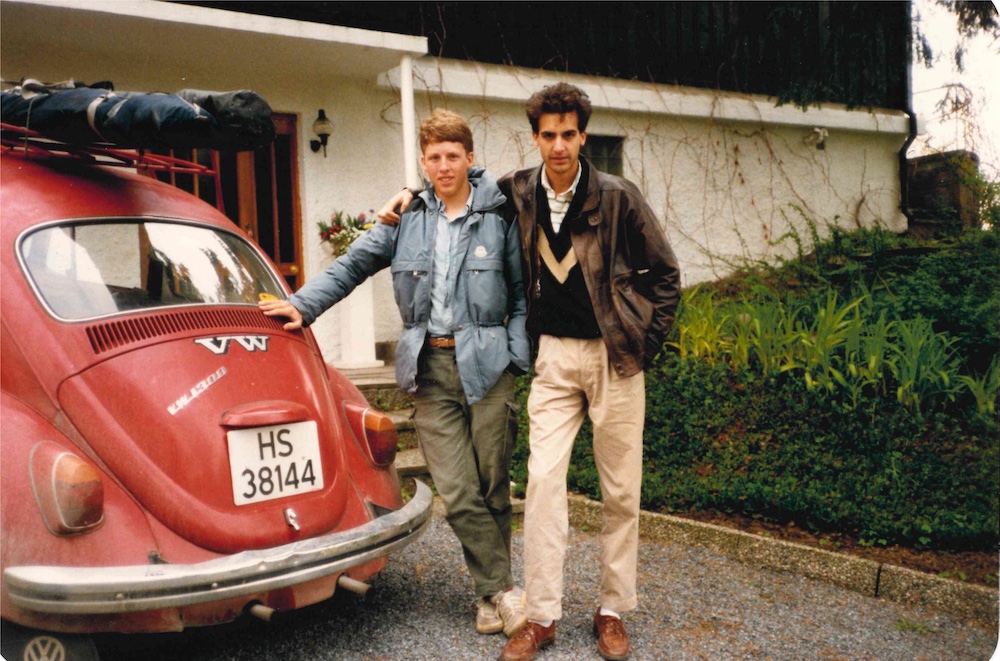
But the coin has two sides, and you’re going to see your friends and teammates struggle with some of the same feelings of futility and desperation that you have now. Many of your friends, teammates, and competitors are not going to survive their twenties. You’re going to be left shocked and speechless every time you hear about another friend.
You’ve heard it said that your brain is your most important muscle in sports, and I know you think that’s nonsense – everyone can see that it’s your heart, lungs and muscles that are most important in this sport. But you’re going to find out as you get older that it’s actually true; your brain really is your most important organ. Without focus, without willpower, without problem-solving, we’re not going to accomplish much. My friend Roy, who was an all-star Division I college basketball player and went on to play a decade in the pros, told me recently, “When I was younger, I wanted to explore the limits of what my body could do, but as I got older I gradually became a lot more interested in exploring the limits of my mind.”
Now I have some advice for you. If you want to do better at this sport than I did, spend less time thoughtlessly bashing yourself through workouts than I did. Instead, find ways to train smarter. Don’t just take all your coaches’ advice and grind through the training on the presumption that if you just do the workouts prescribed by whomever your coach happens to be, the success will automatically follow. That’s not a given. The most successful athletes in any sport have always been the creative ones who found their own way to do things nobody had done before. Among skiers, Bill Koch, Gunde Svan, Marit Bjørgen, Kikkan Randall, Petter Northug, Bode Miller… all of these skiers did things their own way, and in so doing became the best, or among the best, in the world. And the most successful skiers I’ve known here at UAA have been the ones who haven’t always agreed with what their coaches have told them. They’ve had their own opinions and they’ve been pretty stubborn. The best skiers I’ve known here at UAA… coaching them has not always been a picnic.
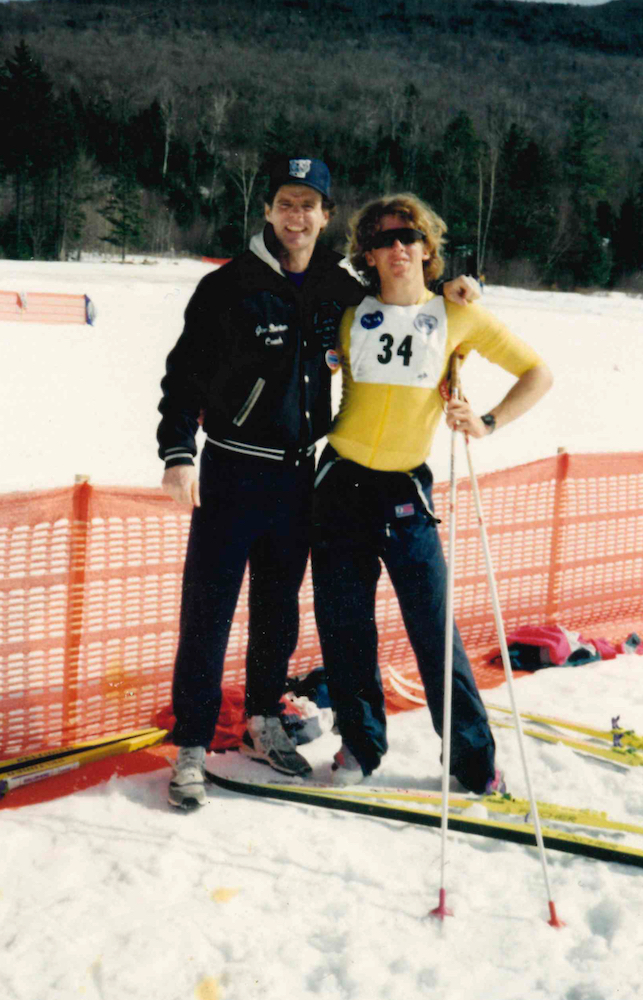
The most important think that you should know, though, is that success in this sport is not going to turn you into something else; it’s not going to get you millions of dollars and a future in Hollywood. I know (because I remember) that you have this vague notion that there’s some kind of firm and defined dividing line between “success” and “not success” in this sport. I know that you have this foggy conceptualization that if you can achieve “success” by whatever criteria you’re defining it at the moment, then everything will be OK, you will have “made it” and you’ll be happy and satisfied and relaxed and proud of yourself. And I know that you don’t allow yourself to think about the consequences to your psyche if you don’t achieve “success,” whatever that means.
But I can tell you now, as your future 53-year-old self, that the reality is nothing like this. For example, my biggest regret in skiing is not quite ever winning an NCAA Championship. I came very close a couple of times, but never quite pulled it off. Nevertheless, the time I came closest was when I was beaten by my teammate in one of my best, most focused, and most excellent races ever. It was such a dramatic and fun day for me! Thus, as it turns out, my biggest regret in this sport is also one of my very favorite and most special moments.
You think that “success” and “not success” are defined by results, on paper. But I can tell you that, in hindsight, one of my proudest moments in this sport was a few years ago when my friend Ian told me that he used to call me “The Scrapper” because it was his impression that I would never give up, regardless of how well or how poorly I was doing. If there was going to be a battle for 467th place, I was going to fight hard to win that little battle. It made me feel so good to hear that from Ian, who is the same age as me but has always seemed to me like a role model, much more mature and a far better athlete than me, ever since we were young. Hearing Ian say that to me felt as much like “success” as I’ve ever felt.
“Success” and “not quite” are not nearly as defined and concrete as your young mind now conceives them to be. You’re going to find out, gradually over time, that your definition of success will morph and change in relation to, and in synch with, your goals. You’ll recalibrate to your successes and you’ll rationalize your failures. And you’ll also find out, because you’ll have friends with Olympic gold medals, that after the elite-level skiing is over, life goes on and these people do normal-people stuff just like you and me, with jobs and spouses and dinner parties and divorces and mortgages and everything else.
After the ski racing career is over, the most important and salient thing you’re going to be left with, contrary to this vague idea you have now, is not going to be a million dollars or a Hollywood acting career or free beers for life.
The most important and lasting thing you’re going to be left with is the memories of the good times you’ll have, and the friends you’re going to make.
As my friend Lucy, who was on another country’s national team, and about the same age as me, and whom I visited earlier this fall while on a motorcycle trip, said, “I can’t hardly remember what I had for breakfast this morning, but I remember all those crazy times racing in Europe like it was yesterday, and all the friends made along the way. And those good times and those good friends are the most special thing.”
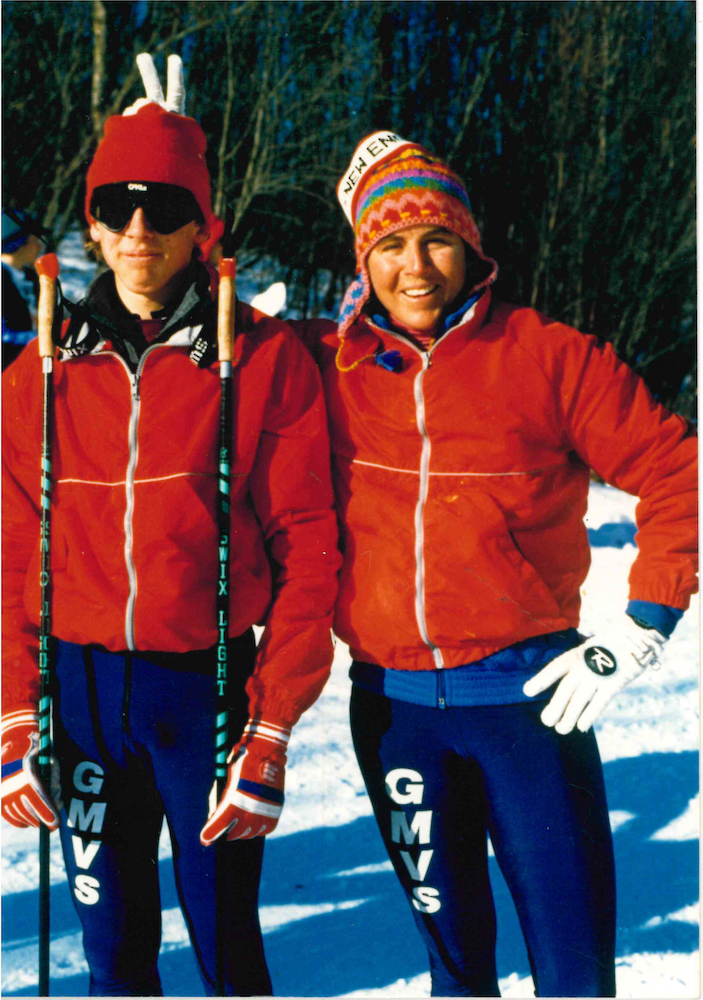
So now, as I’m writing to you, they’re letting me be a volunteer assistant coach for a group of kids who are just a few years older than you are now. I hate to break it to you, but these kids seem much more mature and pleasant to be around than you will be when you go to college in a couple of years. Your college life will be a lot more pleasant for you and those around you if you could just dial down the intolerance and dismissal of your teammates’ goals which may be a little different or a little less all-consuming than your own. You could learn a thing or two from one of our current UAA kids, who is a lot better skier than you will be, who told me a few weeks ago that if he couldn’t be a personable and friendly guy for his friends and teammates to be around, he would quit the sport. Because it wouldn’t be worth compromising his humanity just to be a successful athlete. I found this statement shocking and profound, and I’ve been thinking about it a lot lately. It occurred to me that when I was his age, I had pretty much the opposite point of view. And it probably showed.
Seventeen-year-old Adam, you have a lot to learn in the years ahead. But even now, I’m finding out that I have so much to learn from the young people I’m around. This volunteer coaching gig gives as much to me as I give to it. The energy and curiosity of our skiers goes back with me to my “day-job” office after ski practice and influences how I handle the rest of my day. Their optimism and vigor inspire me to try new things and take chances for myself. Their search for purpose and meaning nudges me out of my own complacency, both physically and mentally.
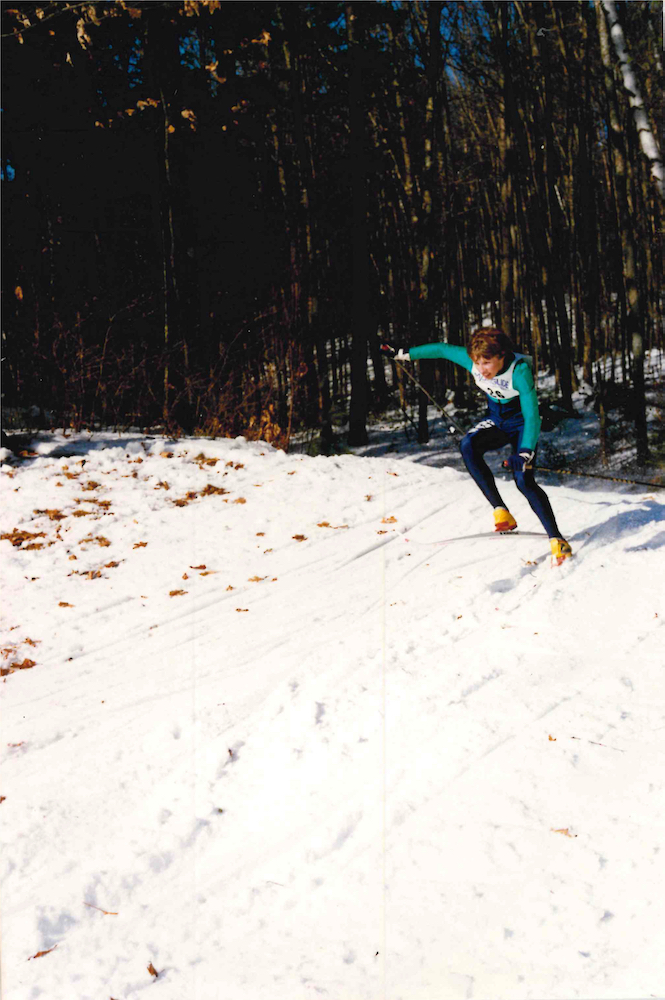
Ultimately, my advice to you, seventeen-year-old Adam, is to tone it down with the obsessing and worrying about the future, and about achieving success. Connecting with the experiences and the people around you won’t prevent you from training hard or training smart. Enjoying the journey won’t preclude success. The fire and brimstone stuff is great as a race-day tool to help you achieve a transcendent performance, but it has no place in the team van.
And ultimately, none of this matters as much as you think it does.
* * *
If you are interested in submitting a letter to your younger self, or know of someone with a compelling story that might be a good fit, please contact us at info@fasterskier.com with questions or for more information. Don’t be put off by Adam’s credentials; we’d love to hear from you even if you’re not a former Olympian.
Previously in this series:
Letters to My Younger Self: John Wood and Returning to a Lifelong Sport
Gavin Kentch
Gavin Kentch wrote for FasterSkier from 2016–2022. He has a cat named Marit.
